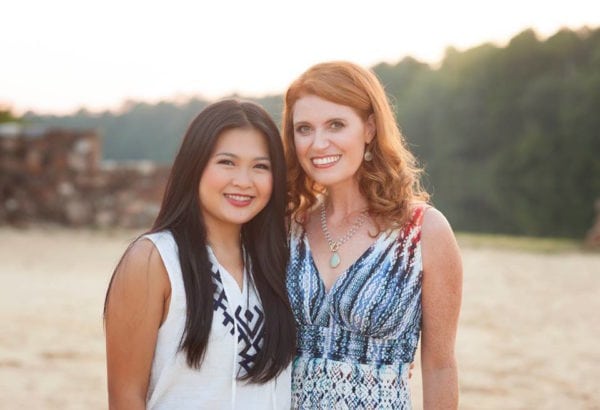Parents talk about a lot of things with other parents. You know that already.
Some kids might feel a little annoyed at all the talking. That makes sense to me. If kids think their parents are talking all about them and telling people about mistakes their kids have made and that sort of thing, of course they’d be annoyed.
Your parents might be doing that. I mean, they could be. I wonder though if your parents aren’t talking so much about bad things you’ve done as they are about what they can do to be the best parents they can be for you.
I mean, some parents may really think they are experts at this parenting thing and have it nailed. But most of the moms and dads I know have some things they are doing as parents that they think are working and they feel really secure about and other things they worry they aren’t getting right at all.
Most parents really do worry about messing up and being enough for their kids. Especially the parents I know who have kids they adopted. That’s not because adoption is weird or hard or causes all sorts of trouble for them. It’s because they know you had a hard start and they really want to do right by you.

One of the things we parents think a lot about and talk a lot about is attachment. Not an attachment like a picture in an email. The attachment we talk about is about people connecting to each other and what people learn about themselves and how the world works through those connections starting at the very beginning. It’s a pretty big deal actually.
Check it out — imagine a baby, any baby. Think about everything that baby needs: milk, food, a blanket to keep them warm, some place safe to sleep, clothes, medicine when they are sick, diapers and diaper changes. Of all the things a baby needs, what do they need most of all? A grownup. They literally can’t get any of the things they need by themselves. They are completely dependent on someone else for ev-er-y-thing.
When a baby is hungry or cold or scared or whatever, they cry. That’s what they’re supposed to do. Crying is how babies say, “I need something! I need something! Something’s wrong.” And when a baby cries, a good mom or dad comes and fixes it with a bottle or a blanket or simply by rocking the baby or patting the baby’s back, telling them everything will be okay.
Crying then fixing.
Crying then helping.
Crying then making everything better.
That pattern happens over and over again for a baby. I have no idea how many times a day it happens, but I can say it’s a ton of times. And, as it happens over and over again every day, that baby learns some really important things about who she is and how the world works. She learns that she matters, that she has a voice in the world. She learns that big people take care of little people, and she learns that her big person is not only able to take care of her but is willing to.
Not every baby gets a good start like this.
Some babies cry, and no one comes right away to fix whatever is wrong. For some babies, they cry and sometimes their mom or dad comes and fixes the problem and sometimes they don’t, making a pattern that is not really a pattern at all. It’s unpredictable. So instead of learning that he matters and that he can trust his parents to take care of him, he wonders if he really matters and feels confused about how the world works and if he’s safe in it.
Sometimes, parents make the very big decision that they cannot parent the child they made. Sometimes, someone else makes that decision for them because they can’t do the job that their baby deserves. In these cases, instead of living with the parents with whom the baby’s story began, the baby goes somewhere else like to another family who becomes their parents or to an orphanage or foster home.
There are decent orphanages and foster homes where babies cry and their problems get fixed. They get fed. They get changed. They get wrapped in a blanket when they’re cold. They aren’t all dark and bad like they often seem in the movies. But, even still, it’s not the way it’s supposed to be. When a baby cries to say, “I need something! Help me!” the person who comes and fixes the problem may be one of a bunch of different people who do that job and do it differently.
Just picture a baby in that scenario. The baby girl who has already lost the mommy whose voice she knew, whose smell she knew, now lives in a crib in a room of many cribs with babies just like her.
Sometimes she’s helped by a nice lady with glasses who snuggles her a little before putting her back in her crib and moving onto the next one.
Sometimes she’s helped by an older lady who gets the job done and doesn’t have time to give her anything extra.
Sometimes she’s helped by someone who doesn’t like their job at all and has a mean-sounding voice.
Sometimes she’s helped by someone who believes that baby girl is perfect and checks on her first even if other babies who have needs too are crying.
Even though her problems are getting fixed, this pattern is confusing too… so so confusing for a little baby. This baby may have an even harder time learning that she matters, that this world is a safe place, and that she can trust someone else with a deep-down kind of trust to be in charge and take care of her.
God makes us to need each other. Did you know that God makes babies’ eyes only able to see about 12 inches away at first? When babies are nursing from their mamas or drinking a bottle, the distance between their eyes and the eyes of the person holding them is just about 12 inches. So, a whole lot could be going on all around them, but a new baby is literally only able to focus on his mama’s or his daddy’s eyes. It’s like God is saying to babies right from the start, “Psssttt… pay attention to this person. Your mom and your dad will be who helps you make sense of everything.” That’s attachment.
When that doesn’t go well for a baby and when that doesn’t go well as that baby starts to grow because the ones who are supposed to be in charge don’t give that baby what he or she needs or the pattern is messy and confusing, as that child grows into a little boy or a little girl and eventually a teenager like you, he or she might have a harder time than other kids with some things.
It could be hard to let someone else be in charge even when it’s needed.
It could be hard to ask for what he or she needs.
It could be hard to give and receive help and affection.
All of that could make someone who has had a hard start to their story feel really vulnerable. It could be hard to know deep down that you matter and that you are wonderful.
There could be lots of hards for people who didn’t have the best attachment early on.
Your parents may have a lot to learn about what all your hards are and why they’re hard. They probably are still learning what all their own hards are too. But here’s the thing — you’re in this together. You don’t have to do it alone.
And it’s never ever too late to learn new things together.
I get that it isn’t easy, and I get that it may take wrestling through a lot of stuff that you’d like to just ignore. But, your parents are your people, people who wish they could have helped you make sense of the world when you were teeny tiny and want to help you make sense of the world today — imperfectly, sure, of course.
But, I think it’s worth giving them a chance (and a bunch of second chances) because they may just help you learn despite all your hards that you are the most wonderful-est wonderful.
– image by Kelley


























this is one of those conversations that my two at home have frequently with me. It can be so hard for them to understand how someone did not meet those needs for them,
Rebecca, {sigh} it is so very hard.
Love this! I’m going to share it with my teen today!
Sarah, I’d love to hear how that went! Please share!
I would love to share this with Rachel. Is she too young? Yo know her, do you think she can handle it? I know we broached this subject with her in therapy, but I’m thinking it wouldn’t help to reiterate.
Thoughts? Thank you for all you do and being so good at what you do!
Fondly,
Sherry